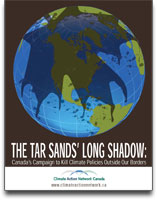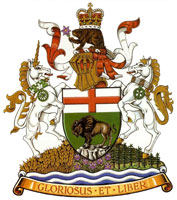
News |
- Birch Island Now Permanent Park
- Manitoba Will Not Meet Kyoto Target Says Auditor General
- Oil Tanker Ban Passes Parliament
- NEB Should Reject Mackenzie Gas Project
- Will Canada Harmonize Climate Policy with the U.S.?
- Elizabeth May Named One of World's Most Influential Women
- Tar Sands' Long Shadow: Canada exports dirty oil and dirty energy policies
- Cap and Trade "Consultation" for Manitobans
- Green Budget 2011: Ecologically, Fiscally Sustainable
- Gift to the Earth Award for Parks Canada
- Throne Speech Announces New Protected Areas
- Boreality: Creative Celebration of Boreal Forests
| Birch Island Now Permanent Park | 14 December 10 |
 Manitoba Conservation has made Birch Island a permanent protected area under the Parks Act.
Manitoba Conservation has made Birch Island a permanent protected area under the Parks Act.Birch Island Park Reserve, located in natural region 5a & b in Lake Winnipegosis was protected in 2000 based on a First Nation community nomination. The interim regulation to protect the island, surrounding waters, plus several small islands, reefs, and shoals for nesting birds, was among the first set of protected areas announcements made by Manitoba's NDP government. In September 2010 Conservation Minister Blaikie said, "We want to protect the Birch Island area for future generations to enjoy as great example of Manitoba’s varied landscapes." Public comments were requested and regulations signed in November 2010. The Birch Island park reserve connects to Chitek Lake Park Reserve, which was also First Nation nominated, though only one third of the lands nominated and approved for protection by Manitoba's mining sector, was protected. View October 28, 2010 Park Reserves Designation Regulation, amendment (PDF)View October 28, 2010 Provincial Parks Designation Regulation, amendment (PDF) View Manitoba Conservation online notice of the 2009 consultation regarding Birch Island (PDF) View Manitoba Wildlands Protected Areas Announcements page Source: Manitoba Government |
|
 Print version Print version |
Top |
| Manitoba Will Not Meet Kyoto Target Says Auditor General | 11 December 10 |
 Auditor General of Manitoba, Carol Bellringer, released her 2010 Report to the Legislative Assembly - Performance Audits including four audits, with an audit of the Manitoba Government performance managing climate change.
Auditor General of Manitoba, Carol Bellringer, released her 2010 Report to the Legislative Assembly - Performance Audits including four audits, with an audit of the Manitoba Government performance managing climate change.The audit shows Manitoba needs to update its current climate change plan, Beyond Kyoto, Manitoba's Green Future, Next Steps: 2008, as Manitoba will not meet it's Kyoto emission reduction targets of a 6% reduction in greenhouse gas (GHG) emissions from 1990 as required under the Kyoto Protocol. Even accepting Manitoba's GHG emission reduction projections for 2012 shows Manitoba emission will be 12% higher than in 1990. Manitoba's 2008 emissions were 17% above 1990 levels according to Environment Canada's National Inventory Report released April 2010. Bellringer highlighted Manitoba's lack of emission targets beyond 2012, and lack of a government-wide tracking system for actual emission reductions, and climate change spending and related economic and social outcomes. In June 2008 Manitoba enacted the Climate Change and Emissions Reduction Act, which enshrined Manitoba's 6% emission reduction by 1990 target into law. The act does not provide any punishment provisions for failure to meet the target, but former Premier Gary Doer suggested: "If we don't achieve it, the ultimate penalty in 2011 will be defeating the government." View December 6, 2010 Office of the Auditor general of Manitoba news release (PDF)View December 2010 Office of the Auditor general of Manitoba report (PDF) View December 6, 2010 CBC News article Listen December 6, 2010 CJOB 680AM story (audio) View December 7, 2010 Winnipeg Free Press article View Beyond Kyoto, Manitoba's Green Future, Next Steps: 2008 Action on Climate Change View Manitoba Wildlands Climate Initiatives page Source: CBC News, Office of the Auditor General |
|
 Print version Print version |
Top |
| Oil Tanker Ban Passes Parliament | 11 December 10 |
 Bill C-502, An Act to amend the Canada Shipping Act, 2001 (prohibition against oil tankers in Dixon Entrance, Hecate Strait and Queen Charlotte Sound), passed third-reading in Canada's House of Commons December 7, 2010. The motion passed by a vote of 143-138 and was supported by all opposition parties, but opposed by Canada's minority Conservative Government.
Bill C-502, An Act to amend the Canada Shipping Act, 2001 (prohibition against oil tankers in Dixon Entrance, Hecate Strait and Queen Charlotte Sound), passed third-reading in Canada's House of Commons December 7, 2010. The motion passed by a vote of 143-138 and was supported by all opposition parties, but opposed by Canada's minority Conservative Government.The motion called for a legislated ban on bulk oil tanker traffic on the sensitive northern coast of British Columbia (BC). "For those who have not been to B.C.'s coast, it is stunning geography with mountains rising to the sky, deep waters and narrow channels... This part of the ocean experiences some of the strongest waves, biggest winds and biggest storms in the world. There have been two major accidents within the last five years alone." said moving NDP Member of Parliament Nathen Cullen. The motion comes as Calgary-based Enbridge Inc. has proposed to send up to 225 oil tankers every year out of Kitimat to carry crude oil to Asia and the western United States. The Enbridge Northern Gateway project also includes a proposed pipeline from Alberta to Kitimat. A coalition of First Nations, commercial fisheries and environmental groups from the Pacific Northwest Coast called for a ban on oil tankers in the region. View Bill C-502, An Act to amend the Canada Shipping Act, 2001 (prohibition against oil tankers in Dixon Entrance, Hecate Strait and Queen Charlotte Sound)View December 7, 2010 CBC News article View November 30, 2010 CBC News article View November 30, 2010 New Democratic Party of Canada press release View West Coast Environmental Law take action web page View December 14, 2010 Coastal First Nations press release (PDF) View 2010 Wilderness Committee Oil Tanker report (PDF) Source: CBC News, West Coast Environmental Law, Parliamentary Hansard |
|
 Print version Print version |
Top |
| NEB Should Reject Mackenzie Gas Project | 11 December 10 |
 Individuals and Environmental Groups are urging the Canadian National Energy Board (NEB) to reject the Mackenzie Gas Project given the refusal of governments to implement independent panel recommendations for sustainability. The NEB's decision is expected before the end of 2010.
Individuals and Environmental Groups are urging the Canadian National Energy Board (NEB) to reject the Mackenzie Gas Project given the refusal of governments to implement independent panel recommendations for sustainability. The NEB's decision is expected before the end of 2010.The proposed 1,200-kilometere Mackenzie Valley natural gas pipeline would move about 1.2 billion cubic feet of natural gas a day from gas fields in the Mackenzie Delta on the Beaufort Sea coast to Alberta to power oilsands production. Canada and Northwest Territories governments issued a formal reply to the 176 recommendations of a panel that studied the proposed C$16.2 billion pipeline to take gas from Canada's Arctic to southern markets November 15, 2010. "The governments have rejected key recommendations from the joint review panel that were carefully designed to control cumulative impacts from induced development, ensure wise end-use of the delivered gas, and would have required independent reporting on government implementation," said Keith Ferguson, Ecojustice staff lawyer. "The Mackenzie Gas Project is economically, socially and environmentally unsustainable," said Sheila Muxlow, director of Sierra Club Prairie. View November 15, 2010 Well and Tribune articleView December 2, 2010 Sierra Club press release View December 6, 2010 Nature Canada blog post View December 1, 2010 Nature Canada letter to National Energy Board (PDF) View November 22, 2010 Nature Canada letter to National Energy Board (PDF) View National Energy Board Mackenzie Gas Project webpage Source: Sierra Club, Well and Tribune, Nature Canada |
|
 Print version Print version |
Top |
| Will Canada Harmonize Climate Policy with the U.S.? | 7 December 10 |
 A December 2, 2010 briefing paper by the Pembina Institute examines the structure and significance of the Obama Administration's plans to start regulating industrial greenhouse gas (GHG) emissions in January 2011 and the implications this has for Canada. Despite the Government of Canada's stated intent to harmonize its climate change policies with the U.S., there are currently Canadian federal regulations to limit GHGs from key industry sectors.
A December 2, 2010 briefing paper by the Pembina Institute examines the structure and significance of the Obama Administration's plans to start regulating industrial greenhouse gas (GHG) emissions in January 2011 and the implications this has for Canada. Despite the Government of Canada's stated intent to harmonize its climate change policies with the U.S., there are currently Canadian federal regulations to limit GHGs from key industry sectors."If Canada matched the U.S. approach, all new oilsands facilities that hadn't begun construction by January 2011 would be subject to federal greenhouse gas regulations. The regulatory route the U.S. is following isn't perfect, but there is no excuse for Stephen Harper's government to continue failing to regulate industrial emissions four years after it first promised to do so," noted P.J. Partington lead author of Pembina's analysis. The briefing paper follows on the heels of the release of freedom of information requests showing that the Canadian Government has been systematically trying to kill clean energy and climate change policies in other countries, including in the U.S. View December 2, 2010 Pembina Institute briefing paper (PDF)View December 2, 2010 Online Journal of the Alberta Environmental Network View Manitoba Wildlands December 4, 2010 news item View November 28, 2010 CTV News article Source: Pembina Institute |
|
 Print version Print version |
Top |
| Elizabeth May Named One of World's Most Influential Women | 7 December 10 |
 Canadian Green Party leader Elizabeth May was named one of the world's most influential women by Newsweek magazine in a November 2010 series on "Women and Leadership".
Canadian Green Party leader Elizabeth May was named one of the world's most influential women by Newsweek magazine in a November 2010 series on "Women and Leadership"."I appreciate being recognized by Newsweek and only hope that their series on women leaders will inspire other women worldwide to speak out and become leaders in their own communities. Young women in particular need to be encouraged to speak up and defend their rights, their communities, and the planet. Women are very powerful and, working together, can be effective initiators of much needed change," said May. "She [Elizabeth] walks the walk and she really does care about saving the world," said long-time friend Sherry Blinkhorn. "When you are one-on-one with her, people will see that she genuinely believes what she says. She is one of the most intelligent people I've ever met." The short list also includes: U.S. First Lady Michelle Obama, U.S. Secretary of State Hillary Clinton, Australia's first female Prime Minister Julia Gillard, Nobel Peace Prize Winner and founder of the Kenyan Green Party Wangari Maathai, and German Green Party Chairwoman Renate Künast -- who according to Newsweek may very well become the first Green to head a state. View November 28, 2010 Newsweek articleView December 1, 2010 Green Party of Canada press release View December 1, 2010 The News (New Glasgow) article View December 1, 2010 CanadaViews.ca article View December 2, 2010 Montreal Gazzette article Source: Newsweek |
|
 Print version Print version |
Top |
| Tar Sands' Long Shadow: Canada exports dirty oil and dirty energy policies | 4 December 10 |
 Documents obtained through freedom of information requests by the Pembina Institute, Natural Resources Defense Council, and Climate Action Network Canada reveal that Government of Canada officials are systematically trying to kill clean energy and climate change policies in other countries while promoting the interests of oil companies. The findings are contained in a new report, The Tar Sands' Long Shadow, released by Climate Action Network Canada, a network of over 75 of Canada's leading non-governmental organizations.
Documents obtained through freedom of information requests by the Pembina Institute, Natural Resources Defense Council, and Climate Action Network Canada reveal that Government of Canada officials are systematically trying to kill clean energy and climate change policies in other countries while promoting the interests of oil companies. The findings are contained in a new report, The Tar Sands' Long Shadow, released by Climate Action Network Canada, a network of over 75 of Canada's leading non-governmental organizations.The correspondence shows Washington based Canadian diplomats describing recommendations from Environment Canada to clean up the oilsands as "simply nutty," proposing instead to "kill any interpretation" of U.S. energy legislation that would apply to Canadian oilsands "to ensure that the oil keeps a-flowing." The correspondence also shows that Canadian diplomats had contacted officials from the American Petroleum Institute as well as Exxon-Mobil Corp., BP, Chevron Corp., ConocoPhillips, Encana Corp., and Marathon Oil Corp. "to point out the potential implication to their imports from Canada." "We have proof that the Harper government is aggressively intervening in Europe and the United States to kill clean energy policies in the name of promoting the tar sands. Canada is not just exporting dirty oil anymore - we're also exporting dirty policies." said Graham Saul of Climate Action Network Canada. "A responsible government would see clean energy policies outside our borders as an opportunity to do better, not as a threat," said Clare Demerse, the Pembina Institute's Associate Director of Climate Change. "We are calling on the governments of Canada and Alberta to stop all efforts to kill clean energy and climate policy in other countries," said Steven Guilbeault of Équiterre. View November 22, 2010 Climate Action Network-Canada press releaseView November 22, 2010 Climate Action Network-Canada report View November 29, 2010 Calgary Herald article View November 29, 2010 Pembina Institute blog post View November 29, 2010 Winnipeg Free Press article View December 1, 2010 Embassy article View Manitoba Wildlands Climate Initiatives page Source: Climate Action Network Canada |
|
 Print version Print version |
Top |
| Cap and Trade "Consultation" for Manitobans | 4 December 10 |
 The Manitoba government has launched a website to gather input on proposed cap-and-trade regulations aimed at reducing harmful emissions from polluting industries. Comments are due by March 15, 2011.
The Manitoba government has launched a website to gather input on proposed cap-and-trade regulations aimed at reducing harmful emissions from polluting industries. Comments are due by March 15, 2011.Climate Action Network Canada board member Gaile Whelan-Enns noted the consultation were inadequate, "it appears there's no public meetings, no presentations, nor is there a public registry." Cap-and-trade analyst Matt Horne of the Pembina Institute agreed that thorough consultation on the topic is vital, "there's a bunch of nuts and bolt issues that really do matter. The devil is in the details." Cap-and-trade is a market-based approach to cutting greenhouse gases that uses economic incentives to force industrial polluters to meet an overall emissions reduction target. Polluters get emission allowances equal to government pollution cap. If a plant's pollution exceeds the target or cap, it must purchase emission allowances from facilities that have reduced more than their share or pay fines. Manitoba's system would integrate with the Western Climate Initiative (WCI), a regional cap-and-trade program. Current WCI members include B.C., Manitoba, Ontario, Quebec, California and six other western U.S. states. No government press release has been issued. View Manitoba Government webpage "Cap and Trade Consultation"View Manitoba Government Proposed Cap and Trade System: Backgrounder (PDF) View November 17, 2010 CBC News article View Western Climate Initiative website View Manitoba Wildlands Climate Initiatives page Source: CBC |
|
 Print version Print version |
Top |
| Green Budget 2011: Ecologically, Fiscally Sustainable | 30 November 10 |
 The Green Budget Coalition (GBC), a coalition of environmental organizations representing over 600,000 Canadians, released their priority recommendations for the 2011 federal budget November 25, 2011. The previous week, on November 19, Canadian Finance Minister Jim Flaherty's kicked-off the government's pre-budget invitational consultations.
The Green Budget Coalition (GBC), a coalition of environmental organizations representing over 600,000 Canadians, released their priority recommendations for the 2011 federal budget November 25, 2011. The previous week, on November 19, Canadian Finance Minister Jim Flaherty's kicked-off the government's pre-budget invitational consultations.The GBC document highlights a suite of subsidy reform measures for oil, mining, nuclear power, and chrysotile asbestos promotion, which could save Canadian taxpayers $800 million per year. These savings could fund most of the GBC's three priority recommendations: (1) a conservation plan for Canada, (2) an energy efficiency program which would put money back into Canadians pockets, and (3) investments in Canada's freshwater resources. "We are heeding widespread desires for fiscal constraint and for integrating the government's economic, energy, and environmental strategies," said Barry Turner, chair of the Green Budget Coalition, and Director of Government Relations, Ducks Unlimited Canada. "This is a prime time to end expensive subsidy programs which act contrary to the government's sustainability objectives." "At the same time, it is crucial that the federal government preserves its existing capacity to protect the environment, nature and Canadians' health from pollution. The oil leak in the Gulf of Mexico has highlighted the extensive costs that can occur when environmental protection is sacrificed for short-term financial savings," added Turner. View Green Budget Coalition websiteView November 2010 Green Budget Coalion's Recommendations for Budget 2011 (PDF) View November 19, 2010 The Globe and Mail article View November 25, 2010 Sierra Club of Canada press release View November 26, 2010 The Tyee article View November 4, 2010 Climate Action Network report, Fueling the Problem (PDF) View November 2010 IISD report, Fossil Fuels - At What Cost? Source: The Green Budget Coalition |
|
 Print version Print version |
Top |
| Gift to the Earth Award for Parks Canada | 30 November 10 |
 The recent growth of Canada's national park system has earned Parks Canada a prestigious Gift to the Earth Award nomination from World Wildlife Fund (WWF)-Canada.
The recent growth of Canada's national park system has earned Parks Canada a prestigious Gift to the Earth Award nomination from World Wildlife Fund (WWF)-Canada.A Gift to the Earth is a public celebration from WWF of a significant conservation action by a government, company or other organization. In recognizing an action as a Gift to the Earth, WWF highlights both environmental leadership and inspiring conservation achievement, which contributes to the protection of the living world. In the first hundred years of its National Parks system, Canada set aside about 277,000 km2 of lands and waters. In the past four years, the government has taken steps that will add nearly 90,000 km2 to the lands and waters administered by Parks Canada once regulations are in place. Included is the six-times expansion of Nahanni national park, as well as the creation of the Lake Superior and Gwaii Haanas national marine conservation areas. "As WWF's highest accolade, this recognizes Parks Canada's many significant conservation achievements, including its globally significant track record in creating protected areas and reintroducing endangered species. We are proud to work with Parks Canada and look forward to the next 100 years of Parks Canada conservation efforts," said Gerald Butts, President and CEO of WWF-Canada. View November 25, 2010 Parks Canada press releaseView November 25, 2010 Parks Canada Press Release Backgrounder View Parks Canada Minister's Corner, WWF-Canada nominates Parks Canada for prestigious international award View WWF-International "Gifts to the Earth" webpage Source: World Wildlife Fund |
|
 Print version Print version |
Top |
| Throne Speech Announces New Protected Areas | 30 November 10 |
 The November 16th 2010 Manitoba Throne Speech announced two new protected areas in the north east corner of the province. Neultin and Colvin parks are based on previous site design by Manitoba Conservation staff, and technical review with the Mining Association of Manitoba. Both candidate sites have been in the system for several years.
The November 16th 2010 Manitoba Throne Speech announced two new protected areas in the north east corner of the province. Neultin and Colvin parks are based on previous site design by Manitoba Conservation staff, and technical review with the Mining Association of Manitoba. Both candidate sites have been in the system for several years.The Throne Speech claimed that the Manitoba government has protected one million hectares of land and waters in the last year. In the period between October 2009, and January 2010 the regulatory steps were taken to protect: Kaskatamagan and Kaskatamagan Sipi wildlife management areas (WMA). These were reported in the Manitoba Wildlands protected areas grade for 2009. (Of the 558,810 ha Kaskatamagan WMA 259,530 ha are protected, in Kaskatamagan Sipi WMA the entire 133,820 ha are protected) As of November 30, 2010 regulatory steps to protect the two new parks are not complete, and surveys of the designations are not available. Lack of surveys and online mapping data leaves the size of these new parks unknown, as boundaries were adjusted a few times. No government press release, or website content exists for the parks announced November 16, 2010. "We are pleased to see the Selinger government taking steps to catch up on protected areas establishment in our boreal regions. It should be noted, though, these four new protected areas are all above the tree line. Commitments to establish new protected areas in boreal regions includes where there are forests! Action for an advisory committee regarding protection of northern peatlands and their carbon reservoirs is lagging. Information that used to be transparent regarding consultations before new protected areas are announced, is not available." commented Gaile Whelan Enns, director of Manitoba Wildlands. Manitoba Wildlands issues an annual protected areas audit and grade for government actions in our province, based on the calendar year. The same grading criteria and technical standards have been used for the Manitoba protected areas grade over the last two decades. View Manitoba Wildlands Protected Areas Announcements pageView Manitoba Wildlands Protected Areas/Parks Reviews page View Manitoba Wildlands Protected Areas Grades & audit page Source: Manitoba Wildlands |
|
 Print version Print version |
Top |
| Boreality: Creative Celebration of Boreal Forests | 30 November 10 |
 Boreality a unique, collaborative creation between Prairie Fire Press (PFP), the Manitoba Chamber Orchestra (MCO), communities in northern Manitoba and four Winnipeg-based artists will profile one of Canada's, and indeed the world's, environmental treasures: Manitoba's boreal forest. This three-year project celebrates the boreal forest of Manitoba through writing, sound, music and photography.
Boreality a unique, collaborative creation between Prairie Fire Press (PFP), the Manitoba Chamber Orchestra (MCO), communities in northern Manitoba and four Winnipeg-based artists will profile one of Canada's, and indeed the world's, environmental treasures: Manitoba's boreal forest. This three-year project celebrates the boreal forest of Manitoba through writing, sound, music and photography.In the exploratory phase (2008-09), the creative team traveled the boreal forest, encountered nature and learned from the people who live in boreal forest communities. Immediately following this Katherine Bitney, Prairie Fire Press's first writer-in-residence, began work on a special issue of Prairie Fire, to be released in 2012, featuring a long poem/libretto written by Bitney, along with work on the boreal theme by writers and artists from across Manitoba and Canada. Winnipeg composer Sid Robinovitch then uses Ms. Bitney's poem as a libretto in order to create a 25-minute work for chamber orchestra and 24-person choir. Ken Gregory will produce a soundscape for the piece, using recorded sound from the boreal forest. The resulting work will be performed April 11, 2011 in the schools of Hollow Water (also known as Wanipigo) and Falcon Beach, two remote communities on the east shore of Lake Winnipeg. The performance will feature fiddle students from the two communities in a full orchestral performance. A Winnipeg performance will follow on April 13, 2011 at the Westminster Church (745 Westminster Avenue). View Prairie Fire, "Boreality Project" websiteView Manitoba Chamber Orchestra "Boreality Project" webpage View December 15, 2008 Aqua Books press release Source: Prairie Fire |
|
 Print version Print version |
Top |


 RSS Feeds:
RSS Feeds: